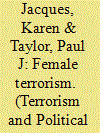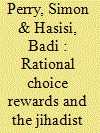|
|
|
Sort Order |
|
|
|
Items / Page
|
|
|
|
|
|
|
| Srl | Item |
| 1 |
ID:
089991


|
|
|
|
|
| Publication |
2009.
|
| Summary/Abstract |
The sharp growth in the number of publications examining female involvement in terrorism has produced a valuable but un-integrated body of knowledge spread across many disciplines. In this paper, we bring together 54 publications on female terrorism and use qualitative and quantitative analyses to examine the range of theoretical and methodological approaches in these papers. Using a content analysis, we identify six primary research foci: Portrayal in media, Feminism, Interviews with terrorists, Group roles, Motivation and recruitment, and Environmental enablers. Results revealed a reliance on secondary rather than primary data, narrative rather than statistical comparisons, and descriptions rather than explanations of events.
|
|
|
|
|
|
|
|
|
|
|
|
|
|
|
|
| 2 |
ID:
190900


|
|
|
|
|
| Summary/Abstract |
In 2014, eight years prior to the Russian invasion of Ukraine in 2022, Russian-backed separatists seized parts of the Ukrainian regions Luhansk and Donetsk. Shortly thereafter, thousands of Ukrainians voluntarily enrolled to various paramilitary battalions. Unlike the Right Sector's Volunteer Ukrainian Corps (RS VUC), almost all battalions were incorporated into Ukrainian official defence structures. Applying uncertainty-identity theory and based on interviews, observations, and documents, this study investigates the attractiveness of RS VUC prior to the 2022 war, motivating the fighters to join this organisation and to remain in it. The study found that fighters of RS VUC distrusted society, the wider population, and state authorities. RS VUC, with its high fighting morale, discipline, family-like relationships between fighters, as well as its clear ideology and boundaries between ‘us’ and ‘them’, were attractive to the fighters since its unambiguous group prototypes and high entitativity, reduced the fighters’ self-uncertainty regarding their social identity in an uncertain environment. The findings also revealed that the fighters’ choice to join RS VUC can be understood as a rational decision, since RS VUC's group entitativity provided the fighters with moral and emotional benefits, as well as maximised their chances of survival.
|
|
|
|
|
|
|
|
|
|
|
|
|
|
|
|
| 3 |
ID:
127716


|
|
|
|
|
| Publication |
2014.
|
| Summary/Abstract |
In the debate on intelligence contracting, intelligence officers are grouped into two personnel categories characterized by opposing sets of motivations and interests. Government employees are assumed to be motivated by a higher goal related to national security, while intelligence contractors are said to be motivated primarily by pecuniary interests and loyal first and foremost to their shareholders. Contemporary research on human motivation, however, suggests that the two personnel categories are not all that different in that both appear to be intrinsically motivated and loyal primarily to the mission at hand, namely national security. Moreover, comparative research on public organizations and private corporations suggests that there are more similarities between the two than there are differences. This must lead us to re-examine the recent criticism fielded against the practice of intelligence contracting.
|
|
|
|
|
|
|
|
|
|
|
|
|
|
|
|
| 4 |
ID:
186150


|
|
|
|
|
| Summary/Abstract |
This article examines motivational factors that push and pull Turkish citizens to join ISIS, based on a content analysis of 132 interviews. The four push factors revealed in the analysis are socioeconomic conditions, lack of meaningfulness, social exclusion, and personal trauma, while five pull factors are material incentives, Kurdistan Worker’s Party (PKK) rhetoric, opposition to al-Assad’s regime, discourse of redemption, and declaration of the caliphate. There are two main findings: first, terrorist organizations abuse society’s tolerance of religious groups, and second, Turkey’s Syrian foreign policy as well as the actions of groups linked to PKK are both influential.
|
|
|
|
|
|
|
|
|
|
|
|
|
|
|
|
| 5 |
ID:
171646


|
|
|
|
|
| Summary/Abstract |
This article analyses findings from an original survey of 187 private military contractors on their incentives for working in the industry. Perceptions of contractors as “greedy, ruthless, and unscrupulous mercenaries” shape both public and military opinions of outsourcing and may impact U.S. military effectiveness, civil–military relations, and contractor identity. We find that contractors are motivated by a range of factors and that their financial experiences are not clearly more positive than that of state military troops. We recommend broad education of military and defense officials and the public in the U.S. and other relevant nations, regarding the true incentives of modern-day, Western contractors, in an effort to dispel misperceptions, increase effective utilisation of contractors, and beneficially shape PMC-military coordination. DoD may consider integrating such training into its current efforts to improve outsourcing, including its Joint OCS Planning and Execution Course, pre-deployment fora, and curricula of advanced military studies schools.
|
|
|
|
|
|
|
|
|
|
|
|
|
|
|
|
| 6 |
ID:
138775


|
|
|
|
|
| Summary/Abstract |
Suicide terrorism is the most violent and horrifying form of terrorism in the world today. This kind of terrorism causes many fatalities and can throw an entire nation into a state of panic. We usually attribute this kind of terrorism to altruistic motivation, assuming that bombers are willing to sacrifice themselves for a higher cause. The current study uses the criminological theory of Rational Choice to analyze the motivation of jihadist suicide terrorism. By reviewing the religious, personal, and social incentives, we demonstrate that even those who kill themselves in suicide attacks, which are seemingly examples of irrational or altruistic behavior, do so while considering future, self-gratifying benefits. Since this self-destructive behavior is mostly driven not by altruistic motivation but by the anticipation of costs and benefits, we find that there is no fundamental difference between the perpetrators’ motivations and those of other criminals; both groups are committed to maximizing self-gratifying, beneficial behavior.
|
|
|
|
|
|
|
|
|
|
|
|
|
|
|
|
| 7 |
ID:
132303


|
|
|
|
|
| Publication |
2014.
|
| Summary/Abstract |
Although much has been written about how and why individuals become terrorists, very little research has focused on why individuals choose not to become involved in political violence. Some assume that these non-radicalized individuals simply have not had the same life experiences as terrorists. Yet one only has to explore areas of conflict, such as the Gaza Strip, northwest Pakistan, or the southern Philippines, to wonder why more individuals have not joined local militant groups. This article presents a conceptual model ofnon-radicalization in an attempt to move the discussion forward on this topic. It argues that it is impossible to understand radicalization pathways, or design policies to preempt them, without a complementary knowledge ofwhy individuals resist the influence ofviolent extremism.
|
|
|
|
|
|
|
|
|
|
|
|
|
|
|
|
|
|
|
|
|